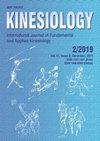How does perceived autonomy-supportive and controlling behaviour in physical education relate to adolescents’ leisure-time physical activity participation?
IF 0.9
4区 医学
Q4 REHABILITATION
引用次数: 12
Abstract
In line with the tenets of self-determination theory, the current study tested associations of perceived autonomy-supportive and controlling behaviour from PE teacher with adolescents’ leisure-time physical activity (LT PA) participation, and the role of need satisfaction and need frustration, autonomous motivation and controlled motivation in PE, and perceived effort towards LT PA as mediators of these associations. Adolescents (N=381) aged between 12 and 15 years completed self-reported measures of respective constructs. Results of the structural equation modelling demonstrated that perceived autonomy-supportive behaviour from PE teachers was related to adolescents’ LT PA participation only via experiences of need satisfaction and autonomous motivation in PE, and perceived effort towards LT PA. Perceived controlling behaviour from PE teachers was found to be related to adolescents’ LT PA participation only via experiences of need frustration and controlled motivation in PE, and perceived effort towards LT PA. The current study provided evidence that perceived autonomy-supportive behaviour and perceived controlling behaviour from PE teachers contributes to adolescents’ LT PA participation through unique pathways. Findings highlight the facilitative role of autonomy-supportive behaviour from teachers in a PE context on adolescents’ LT PA participation. In addition, the beneficial role of controlled motivation in PE, although instigated by students’ perceptions of controlling behaviour from teachers and experiences of need frustration in PE, on adolescents’ LT PA participation was supported.Key words: autonomy-supportive behaviour, controlling behaviour, psychological needs, autonomous motivation, controlled motivation, leisure-time physical activity体育教育中的自主支持和控制行为与青少年休闲体育活动的参与有何关系?
根据自我决定理论的原则,本研究测试了体育教师感知到的自主支持行为和控制行为与青少年闲暇时间体育活动(LT PA)参与的关联,以及体育活动中需要满足和需要挫折、自主动机和控制动机以及感知到的对LT PA的努力作为这些关联的中介的作用。年龄在12至15岁之间的青少年(N=381)完成了各自构念的自我报告测量。结构方程模型的结果表明,体育教师感知到的自主支持行为仅通过体育需求满足和自主动机的体验,以及感知到的对自主学习的努力,与青少年自主学习参与相关。体育教师的感知控制行为仅通过体育需求挫折和控制动机的体验以及感知努力与青少年LT PA参与有关。本研究表明,体育教师的自主支持行为知觉和控制行为知觉通过独特的途径对青少年LT - PA参与有促进作用。研究结果强调了体育背景下教师自主支持行为对青少年LT PA参与的促进作用。此外,尽管学生对教师控制行为的感知和体育需求挫折的经历激发了体育控制动机对青少年LT PA参与的有益作用,但这一作用得到了支持。关键词:自主支持行为,控制行为,心理需求,自主动机,控制动机,休闲时间身体活动
本文章由计算机程序翻译,如有差异,请以英文原文为准。
求助全文
约1分钟内获得全文
求助全文
来源期刊

Kinesiology
REHABILITATION-SPORT SCIENCES
CiteScore
1.90
自引率
8.30%
发文量
16
审稿时长
>12 weeks
期刊介绍:
Kinesiology – International Journal of Fundamental and Applied Kinesiology (print ISSN 1331- 1441, online ISSN 1848-638X) publishes twice a year scientific papers and other written material from kinesiology (a scientific discipline which investigates art and science of human movement; in the meaning and scope close to the idiom “sport sciences”) and other adjacent human sciences focused on sport and exercise, primarily from anthropology (biological and cultural alike), medicine, sociology, psychology, natural sciences and mathematics applied to sport in its broadest sense, history, and others. Contributions of high scientific interest, including also results of theoretical analyses and their practical application in physical education, sport, physical recreation and kinesitherapy, are accepted for publication. The following sections define the scope of the journal: Sport and sports activities, Physical education, Recreation/leisure, Kinesiological anthropology, Training methods, Biology of sport and exercise, Sports medicine and physiology of sport, Biomechanics, History of sport and Book reviews with news.
 求助内容:
求助内容: 应助结果提醒方式:
应助结果提醒方式:


